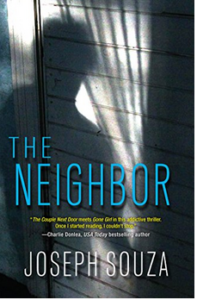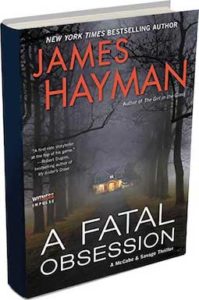This is the End: Writing A Compelling Ending
Wednesday, June 20th, 2018
Any successful thriller writer will tell you that your book’s got to have a slam bang opening. But here Joseph Souza, author The Neighbor, a crackerjack novel I reviewed as “A taut, twisty psychological thriller,” tells us why a great ending is equally important.
Have you ever arrived at the end of your novel and realized it just didn’t work? Or that you had no idea how to end it? Or who did the crime and why they did it? If the answer to these questions is yes then don’t feel like you’re alone. All of us writers feel this way at one point or another.
Writing a compelling ending is hard work. It requires a lot of thought and contemplation. You have to be adaptable and willing to look at your story from different angles. How many times have we read a great novel, often one by a big name author, and been sorely disappointed by the ending? It’s almost as if they got tired of their story and just stopped. As writers, we definitely don’t want to leave our hard-earned readers on a sour note.
If writing endings were easy, everyone would be a writer. At times, I wish being a writer was like being a starting major league pitcher. You pitch the first eight innings of the game and then have a closer come in to finish the ninth for you. But alas, if you want to be an author, writing a satisfying ending is something we must learn to do.
Using another sports analogy; the best defense is often a good offense. And by this I mean that half the battle in composing a great ending is writing a great story. Making the reader care how your story ends means you’ve done a successful job holding their interest. Now you need to smoothly land this jet plane that is your plot and make sure your passengers get to their gates. You’ll need to provide an ending that will give closure and allow the reader to walk away satisfied.
The type of book you’re writing can often determine the type of ending you’re shooting for. A police procedural or cozy mystery requires that the ending be neatly wrapped up. Domestic thrillers, which I write, often have ambiguous endings, leaving the reader wondering what just happened. A great example of this is Gillian Flynn’s GONE GIRL. After all the horrendous things Nick’s wife has put him through during the course of the novel, Nick realizes at the end that he can’t just up and leave her. Amy’s gotten herself pregnant, and Nick is terrified that his child will be raised by this evil woman.
Many readers were angry that Flynn ended her novel this way. Others loved this ambiguous ending. It left the reader contemplating about will happen next in their relationship. It’s the same reaction many viewers had when watching the last episode of The Sopranos. Tony and his family are sitting in the booth of a diner. Mysterious people walk in and out. There’s something tense and scary about this scene. We wonder what’s going to happen. Will Tony and his family get killed? Then the screen goes black and that’s the end of the show. Some people loved this ending while others despised it and felt they’d been cheated for all the time and effort they put in watching the series.
The show, Breaking Bad, on the other hand, has a well defined plot arc that resembles a rainbow; at the end is a pot of gold. The writers wrapped up the show and left no question about Walt’s fate. Each show ended differently, for entirely different reasons, and each ended in interesting fashion. The ending fit the story line.
Not to get metaphysical, but what actually is an ending? If you ask yourself this question, I believe it will make writing your endings that much easier. Or at least less harder. Because, when one thinks about it, an ending is merely the beginning of something else. Consider what will happen to your surviving characters after your book ends. If it’s a series, the conclusion will impact how your characters act and think in the next book.
The most important aspect of your ending is this: how will the main characters change or be changed by the events that happened in your plot. Sometimes a violent, action-packed ending is not what’s needed. Sometimes, it’s how your character has changed that leaves the reader emotionally impacted. As in GONE GIRL, Nick is left reeling because he will have to live with his evil wife for the foreseeable future. This type of profound ending hits like a sledgehammer and keeps the reader thinking about your story long after it’s finished.
Lay the groundwork for your ending by writing a killer plot. A strong storyline will do much of the heavy lifting when it comes to crafting the conclusion. Spend time thinking about how to close out your novel even while you’re writing it. Sometimes it helps to write out a few different scenarios before you find the one that fits best. Often, it will take a few rewrites to get it just right. Then, if you’re like me, you’ll listen to your agent and editor, both of whom will give you additional input as to bring your storyline together.
Don’t get discouraged. Endings are tough. Persevere and work your way through them. And with that, I wish you the best writing that killer ending.
Joseph Souza is an award winning and bestselling author. His latest novel, THE NEIGHBOR, was published by Kensington. His next novel, PRAY FOR THE GIRL, will be published May, 2019.
And please don’t forget to look for my latest McCabe/Savage thriller, A Fatal Obsession, coming out on August 21st and available for preorder now!
Follow me on Twitter or Facebook for more details!


